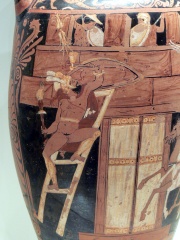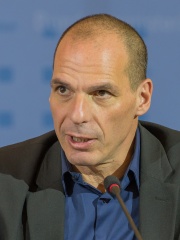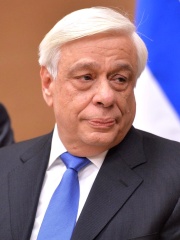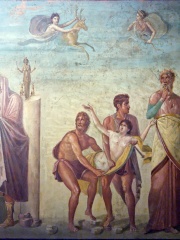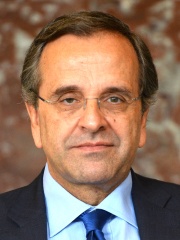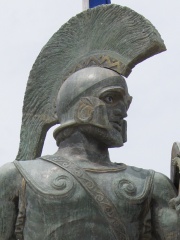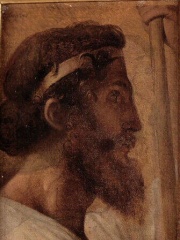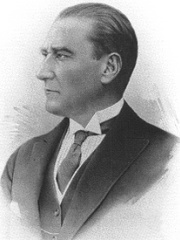
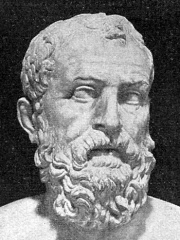


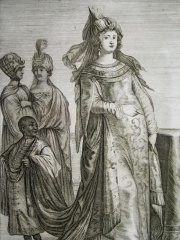
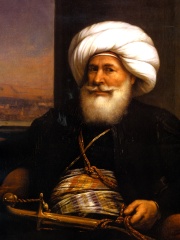
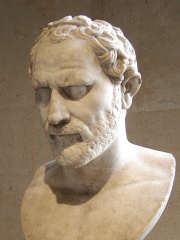
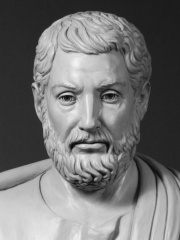
The Most Famous
POLITICIANS from Greece
This page contains a list of the greatest Greek Politicians. The pantheon dataset contains 19,576 Politicians, 378 of which were born in Greece. This makes Greece the birth place of the 11th most number of Politicians behind China, and Japan.
Top 10
The following people are considered by Pantheon to be the top 10 most legendary Greek Politicians of all time. This list of famous Greek Politicians is sorted by HPI (Historical Popularity Index), a metric that aggregates information on a biography's online popularity. Visit the rankings page to view the entire list of Greek Politicians.

1. Mustafa Kemal Atatürk (1881 - 1938)
With an HPI of 91.26, Mustafa Kemal Atatürk is the most famous Greek Politician. His biography has been translated into 205 different languages on wikipedia.
Mustafa Kemal Atatürk (c. 1881 – 10 November 1938) was a Turkish field marshal and statesperson who was the founder of the Republic of Turkey—after the fall of its predecessor, the Ottoman Empire—and served as its first president from 1923 until his death in 1938. He led sweeping reforms, which modernized Turkey into a secular, industrializing nation. Ideologically a secularist, republican and nationalist, his policies and socio-political theories became known as Kemalism. Atatürk's personality cult and the Kemalist historiography developed around it have had significant and ongoing influences on Turkey's political culture and historical narrative. Born in Salonica in the Ottoman Empire, his early military career saw him involved in the Italo-Turkish and Balkan Wars. As a member of the Committee of Union and Progress and the Young Turks, he played an important part in political events of the late Ottoman Empire, such as the Young Turk Revolution and the 31 March Incident. He rose to prominence with his role in the Defence of Gallipoli during World War I. Following the defeat of the empire after the war, he led the Turkish National Movement, which resisted the empire's partition among the victorious Allied powers. Establishing the provisional "Ankara government", he defeated the forces sent by the Allies, thus emerging victorious from the Turkish War of Independence. During and after the war, the ethnic cleansing of Armenians and Greeks from Anatolia outside of Istanbul, including the Kars region invaded by the Kemalist armies, was largely completed via large-scale massacres, flight, expulsions, and the population exchange between Greece and Turkey. His government subsequently proceeded to abolish the Ottoman sultanate in 1922 and proclaimed the Republic of Turkey in its place in 1923. As the president of the newly formed Turkish Republic, Atatürk initiated political, economic, and cultural reforms to build a republican and secular nation-state. He made primary education free and compulsory, opening thousands of new schools all over the country. He also introduced the Latin-based Turkish alphabet. Turkish women received equal civil and political rights during his presidency. His government carried out a policy of Turkification, trying to create a homogeneous, unified and above all secular nation under the Turkish banner. The Turkish Parliament granted him the surname Atatürk in 1934, which means "Father of the Turks", in recognition of the role he played in building the modern Turkish Republic. He died on 10 November 1938 at Dolmabahçe Palace in Istanbul, at the age of 57; he was succeeded as president by his long-time prime minister İsmet İnönü. In 1981, the centennial of Atatürk's birth, his memory was honoured by the United Nations and UNESCO, which declared it The Atatürk Year in the World and adopted the Resolution on the Atatürk Centennial, describing him as "the leader of the first struggle given against colonialism and imperialism". Atatürk attempted rapprochement with the close countries such as Iran, Yugoslavia, Iraq, and Greece, as well as the creation of the Balkan Pact that resisted the expansionist aggressions of Fascist Italy and Tsarist Bulgaria during the interwar period of the 1930s. Despite the positive memories and contributions, he was criticized for a number of atrocities committed under his government and was described as a dictator by his detractors.

2. Solon (638 BC - 558 BC)
With an HPI of 86.59, Solon is the 2nd most famous Greek Politician. His biography has been translated into 78 different languages.
Solon (; Ancient Greek: Σόλων; c. 630 – c. 560 BC) was an archaic Athenian statesman, lawmaker, political philosopher, and poet. He was one of the Seven Sages of Greece and is credited with laying the foundations for Athenian democracy. Solon's efforts to legislate against political, economic and moral decline resulted in his constitutional reform overturning most of Draco's laws. Solon's reforms included debt relief later known and celebrated among Athenians as the seisachtheia (shaking off of burdens). He is described by Aristotle in the Athenian Constitution as "the first people's champion". Demosthenes credited Solon's reforms with starting a golden age. Modern knowledge of Solon is limited by the fact that his works only survive in fragments and appear to feature interpolations by later authors. It is further limited by the general scarcity of documentary and archaeological evidence covering Athens in the early 6th century BC. Ancient authors such as Philo of Alexandria, Herodotus, and Plutarch are the main sources, but wrote about Solon long after his death. Fourth-century BC orators, such as Aeschines, tended to attribute to Solon all the laws of their own, much later times.

3. Pericles (494 BC - 429 BC)
With an HPI of 86.36, Pericles is the 3rd most famous Greek Politician. His biography has been translated into 94 different languages.
Pericles ( ; Ancient Greek: Περικλῆς; c. 495–429 BC) was a Greek statesman and general during the Golden Age of Athens. He was prominent and influential in Ancient Athenian politics, particularly between the Greco-Persian Wars and the Peloponnesian War, and was acclaimed by Thucydides, a contemporary historian, as "the first citizen of Athens". Pericles turned the Delian League into an Athenian empire and led his countrymen during the first two years of the Peloponnesian War. The period during which he led Athens as its preeminent orator and statesman, roughly from 461 to 429 BC, is sometimes known as the "Age of Pericles", but the period thus denoted can include times as early as the Persian Wars or as late as the following century. Pericles promoted the arts and literature, and it was principally through his efforts that Athens acquired the reputation of being the educational and cultural center of the ancient Greek world. He started an ambitious project that generated most of the surviving structures on the Acropolis, including the Parthenon. This project beautified and protected the city, exhibited its glory, and gave work to its people. Pericles also fostered Athenian democracy to such an extent that critics called him a populist. Pericles was descended, through his mother, from the powerful and historically influential Alcmaeonid family. He, along with several members of his family, succumbed to the Plague of Athens in 429 BC, which weakened the city-state during a protracted conflict with Sparta.

4. Bayezid II (1447 - 1512)
With an HPI of 83.64, Bayezid II is the 4th most famous Greek Politician. His biography has been translated into 72 different languages.
Bayezid II (Ottoman Turkish: بايزيد ثانى, romanized: Bāyezīd-i s̱ānī; Turkish: II. Bayezid; 3 December 1447 – 26 May 1512) was the sultan of the Ottoman Empire from 1481 to 1512. During his reign, Bayezid consolidated the Ottoman Empire, thwarted a pro-Safavid rebellion and finally abdicated his throne to his son, Selim I. Bayezid evacuated Sephardi Jews from Spain following the fall of the Nasrid Kingdom of Granada and the proclamation of the Alhambra Decree and resettled them throughout Ottoman lands, especially in Salonica.
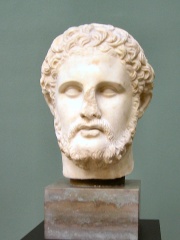
5. Philip II of Macedon (382 BC - 336 BC)
With an HPI of 83.15, Philip II of Macedon is the 5th most famous Greek Politician. His biography has been translated into 80 different languages.
Philip II of Macedon (Ancient Greek: Φίλιππος, romanized: Phílippos; 382 BC – October 336 BC) was the king (basileus) of Macedon from 359 BC until his death in 336 BC. The rise of Macedon, from a kingdom initially at the periphery of classical Greek affairs, to a power that came to dominate Ancient Greece in the span of less than 25 years, was largely thanks to the character and policies of Philip. He was the father of Alexander the Great and a member of the ruling Argead dynasty that founded the kingdom of the Macedonians. Macedon achieved domination over Greece during Philip II's reign by the reformation of the Macedonian army, including the establishment of the Macedonian phalanx, the use of combined arms tactics and his extensive use of siege engines and artillery, as well as by the use of effective diplomacy and marriage alliances. After defeating the Greek city-states of Athens and Thebes at the Battle of Chaeronea in 338 BC, Philip II led the effort to establish a federation of Greek states known as the Hellenic League, with him as the elected hegemon and commander-in-chief of Greece for a planned invasion of the Achaemenid Empire. However, his assassination by a royal bodyguard, Pausanias of Orestis, led to the immediate succession of his son Alexander, who would go on to invade the Achaemenid Empire in his father's stead.

6. Kösem Sultan (1590 - 1651)
With an HPI of 83.07, Kösem Sultan is the 6th most famous Greek Politician. Her biography has been translated into 55 different languages.
Kösem Sultan (Ottoman Turkish: كوسم سلطان; 1589 – 2 September 1651), also known as Mahpeyker Sultan (Ottoman Turkish: ماه پیكر;), was a Haseki Sultan (favorite) and legal wife of Ottoman sultan Ahmed I, Valide Sultan as mother of Murad IV and Ibrahim, and Büyük Valide Sultan as grandmother of Mehmed IV. She served as regent of the Ottoman Empire from 1623 to 1632 during the minority of Murad IV, from 1640 to 1648 during the unstable rule of Ibrahim, and again from 1648 until her assassination in 1651 during the minority of Mehmed IV. She became one of the most powerful and influential women in Ottoman history, as well as a central and controversial figure during the period known as the Sultanate of Women. Kösem's status and influence were facilitated by her astute grasp of Ottoman politics and the large number of children she bore. Her sons and grandson required her regency, and her daughters' marriages to prominent statesmen provided her with allies in the government. She exerted considerable influence over Sultan Ahmed, and it's probable that her efforts on keeping his half-brother Mustafa — who later became Mustafa I — alive contributed to the transition from a system of succession based on primogeniture to one based on agnatic seniority. Kösem was popular with the common citizens and esteemed by the ruling elite, holding significant political power and shaping the empire's domestic and foreign policies. Her early years as regent were marked by unrest and instability, but she nonetheless succeeded in maintaining the state institutions. In 1645, she pressured Sultan Ibrahim to launch a largely unsuccessful naval assault on the Venetian-controlled island of Crete. Afterwards, she had to contend with a Venetian blockade of the Dardanelles, which led to the naval Battle of Focchies in 1649, and in the years that followed, merchant upheavals brought on by a financial crisis. Some historians openly attribute to Kösem a role in the demise of the Ottoman Empire. However, others argue that her policies can be interpreted as desperate attempts to avert a succession crisis and preserve the Ottoman dynasty. She was posthumously referred to by the names: Vālide-i Muazzama ("magnificent mother"), Vālide-i Maḳtūle ("murdered mother"), Umm al Mu'minīn ("mothers of believers"), and Vālide-i Şehīde ("martyred mother").

7. Muhammad Ali of Egypt (1769 - 1849)
With an HPI of 81.97, Muhammad Ali of Egypt is the 7th most famous Greek Politician. His biography has been translated into 70 different languages.
Muhammad Ali (4 March 1769 – 2 August 1849) was the Ottoman Albanian viceroy and governor who became the de facto ruler of Egypt from 1805 to 1848, widely considered the founder of modern Egypt. At the height of his rule in 1840, he controlled Egypt, Sudan, Hejaz, the Levant, Crete and parts of Greece and transformed Cairo from a mere Ottoman provincial capital to the center of an expansive empire. Born in a village in Albania, when he was young he moved with his family to Kavala in the Rumelia Eyalet, where his father, an Albanian tobacco and shipping merchant, served as an Ottoman commander of a small unit in the city. Ali was a military commander in an Albanian Ottoman force sent to recover Egypt from French occupation following Napoleon's withdrawal. He rose to power through a series of political maneuvers, and in 1805 he was named Wāli (governor) of Egypt and gained the rank of Pasha. As Wāli, Ali attempted to modernize Egypt by instituting dramatic reforms in the military, economic and cultural spheres. He also initiated a violent purge of the Mamluks, consolidating his rule and permanently ending the Mamluk hold over Egypt. Militarily, Ali recaptured the Arabian territories for the sultan, and conquered Sudan of his own accord. His attempt at suppressing the Greek rebellion failed decisively, however, following an intervention by the European powers at Navarino. In 1831, Ali waged war against the sultan, capturing Syria, crossing into Anatolia and directly threatening Constantinople, but the European powers forced him to retreat. After a failed Ottoman invasion of Syria in 1839, he launched another invasion of the Ottoman Empire in 1840; he defeated the Ottomans again and opened the way towards a capture of Constantinople. Faced with another European intervention, he accepted a brokered peace in 1842 and withdrew from the Levant; in return, he and his descendants were granted hereditary rule over Egypt and Sudan. His dynasty would rule Egypt for over a century, until the revolution of 1952 when King Farouk was overthrown by the Free Officers Movement led by Mohamed Naguib and Gamal Abdel Nasser, establishing the Republic of Egypt.

8. Demosthenes (384 BC - 322 BC)
With an HPI of 81.70, Demosthenes is the 8th most famous Greek Politician. His biography has been translated into 74 different languages.
Demosthenes (; Greek: Δημοσθένης, romanized: Dēmosthénēs; Attic Greek: [dɛːmostʰénɛːs]; 384 – 12 October 322 BC) was a Greek statesman and orator in ancient Athens. His orations constitute a significant expression of contemporary Athenian intellectual prowess and provide insight into the politics and culture of ancient Greece during the 4th century BC. Demosthenes learned rhetoric by studying the speeches of previous great orators. He delivered his first judicial speeches at the age of 20, in which he successfully argued that he should gain from his guardians what was left of his inheritance. For a time, Demosthenes made his living as a professional speechwriter (logographer) and a lawyer, writing speeches for use in private legal suits. Demosthenes grew interested in politics during his time as a logographer, and in 354 BC he gave his first public political speeches. He went on to devote his most productive years to opposing Macedon's expansion. He idealized his city and strove throughout his life to restore Athens's supremacy and motivate his compatriots against Philip II of Macedon. He sought to preserve his city's freedom and to establish an alliance against Macedon, in an unsuccessful attempt to impede Philip's plans to expand his influence southward, conquering the Greek states. After Philip's death, Demosthenes played a leading part in his city's uprising against the new king of Macedonia, Alexander the Great. However, his efforts failed, and the revolt was met with a harsh Macedonian reaction. To prevent a similar revolt against his own rule, Alexander's successor in this region, Antipater, sent his men to track Demosthenes down. Demosthenes killed himself to avoid being arrested by Archias of Thurii, Antipater's confidant. The Alexandrian Canon, compiled by Aristophanes of Byzantium and Aristarchus of Samothrace, called Demosthenes one of the ten greatest Attic orators and logographers. Longinus likened Demosthenes to a blazing thunderbolt and argued that he had "perfected to the utmost the tone of lofty speech, living passions, copiousness, readiness, speed." Quintilian extolled him as lex orandi ("the standard of oratory"). Cicero said of him that inter omnis unus excellat ("among them all, he excels alone"), and also praised him as "the perfect orator" who lacked nothing.

9. Cleisthenes (565 BC - 492 BC)
With an HPI of 80.84, Cleisthenes is the 9th most famous Greek Politician. His biography has been translated into 55 different languages.
Cleisthenes ( KLYS-thin-eez; Greek: Κλεισθένης), or Clisthenes (c. 570 – c. 508 BC), was an ancient Athenian lawgiver credited with reforming the constitution of ancient Athens and setting it on a democratic footing in 508 BC. For these accomplishments, historians refer to him as "the father of Athenian democracy". He was a member of the aristocratic Alcmaeonid clan. He was the younger son of Megacles and Agariste making him the maternal grandson of the tyrant Cleisthenes of Sicyon. He was also credited with increasing the power of the Athenian citizens' assembly and for reducing the power of the nobility over Athenian politics. In 510 BC, Spartan troops helped the Athenians overthrow the tyrant Hippias, son of Peisistratus. Cleomenes I, king of Sparta, put in place a pro-Spartan oligarchy headed by Isagoras. However, Cleisthenes, with the support of the middle class and aided by democrats, took over. Cleomenes intervened in 508 and 506 BC, but could not stop Cleisthenes and his Athenian supporters. Through Cleisthenes' reforms, the people of Athens endowed their city with isonomic institutions—equal rights for all citizens (though only free men and women were citizens)—and established ostracism as a punishment.
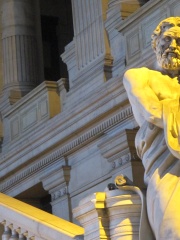
10. Lycurgus of Sparta (800 BC - 730 BC)
With an HPI of 80.63, Lycurgus of Sparta is the 10th most famous Greek Politician. His biography has been translated into 49 different languages.
Lycurgus (; Ancient Greek: Λυκοῦργος Lykourgos) was the legendary lawgiver of Sparta, credited with the formation of its eunomia ('good order'), involving political, economic, and social reforms to produce a military-oriented Spartan society in accordance with the Delphic oracle. The Spartans in the historical period honoured him as a god. As a historical figure, almost nothing is known for certain about him, including when he lived and what he did in life. The stories of him place him at multiple times. Nor is it clear when the political reforms attributed to him, called the Great Rhetra, occurred. Ancient dates range from – putting aside the implausibly early Xenophonic 11th century BC – the early ninth century (c. 885 BC) to as late as early eighth century (c. 776 BC). There remains no consensus as to when he lived; some modern scholars deny that he existed at all. The reforms at various times attributed to him touch all aspects of Spartan society. They included the creation of the Spartan constitution (in most traditions after the dual monarchy), the imposition of the Spartan mess halls called syssitia, the redistribution of land to each citizen by head, Spartan austerity and frugality, and Sparta's unique wedding and funerary customs. None of these reforms can be concretely attributed to Lycurgus. Most of the reforms likely date to the late sixth century BC (shortly before 500 BC), postdating his supposed life by centuries; some of the reforms, such as for the redistribution of land, are fictitious. The extent of the Lycurgan myth emerges from Sparta's self-justification, seeking to endow its customs with timeless and divinely sanctioned antiquity. That antiquity was also malleable, reinvented at various times to justify the new as a return to Lycurgus' ideal society: his land reforms, for example, are attested only after the reformist Spartan monarchs Agis IV and Cleomenes III who sought to redistribute Sparta's land. The reforms attributed to Lycurgus, however, have been praised by ancients and moderns alike, seeing at various times different morals projected on a figure of which so little concrete can be known.
People
Pantheon has 378 people classified as Greek politicians born between 2780 BC and 1990. Of these 378, 38 (10.05%) of them are still alive today. The most famous living Greek politicians include Creon, Katerina Sakellaropoulou, and Yanis Varoufakis. The most famous deceased Greek politicians include Mustafa Kemal Atatürk, Solon, and Pericles. As of April 2024, 4 new Greek politicians have been added to Pantheon including Zoe Konstantopoulou, Nikos Pappas, and Effie Achtsioglou.
Living Greek Politicians
Go to all RankingsCreon
HPI: 75.37
Katerina Sakellaropoulou
1956 - Present
HPI: 72.81
Yanis Varoufakis
1961 - Present
HPI: 70.39
Kyriakos Mitsotakis
1968 - Present
HPI: 69.03
Prokopis Pavlopoulos
1950 - Present
HPI: 68.38
Calchas
HPI: 68.10
Princess Alexia of Greece and Denmark
1965 - Present
HPI: 65.41
Alexis Tsipras
1974 - Present
HPI: 64.46
Antonis Samaras
1951 - Present
HPI: 64.00
Pavlos, Crown Prince of Greece
1967 - Present
HPI: 62.24
Kostas Karamanlis
1956 - Present
HPI: 62.20
Katherine Karađorđević
1943 - Present
HPI: 59.86
Deceased Greek Politicians
Go to all RankingsMustafa Kemal Atatürk
1881 - 1938
HPI: 91.26
Solon
638 BC - 558 BC
HPI: 86.59
Pericles
494 BC - 429 BC
HPI: 86.36
Bayezid II
1447 - 1512
HPI: 83.64
Philip II of Macedon
382 BC - 336 BC
HPI: 83.15
Kösem Sultan
1590 - 1651
HPI: 83.07
Muhammad Ali of Egypt
1769 - 1849
HPI: 81.97
Demosthenes
384 BC - 322 BC
HPI: 81.70
Cleisthenes
565 BC - 492 BC
HPI: 80.84
Lycurgus of Sparta
800 BC - 730 BC
HPI: 80.63
Leonidas I
540 BC - 480 BC
HPI: 80.62
Peisistratos
600 BC - 527 BC
HPI: 80.22
Newly Added Greek Politicians (2025)
Go to all RankingsZoe Konstantopoulou
1976 - Present
HPI: 44.65
Nikos Pappas
1990 - Present
HPI: 36.69
Effie Achtsioglou
1985 - Present
HPI: 36.61
Dimitrios Mouyios
1981 - Present
HPI: 35.47
Overlapping Lives
Which Politicians were alive at the same time? This visualization shows the lifespans of the 25 most globally memorable Politicians since 1700.

